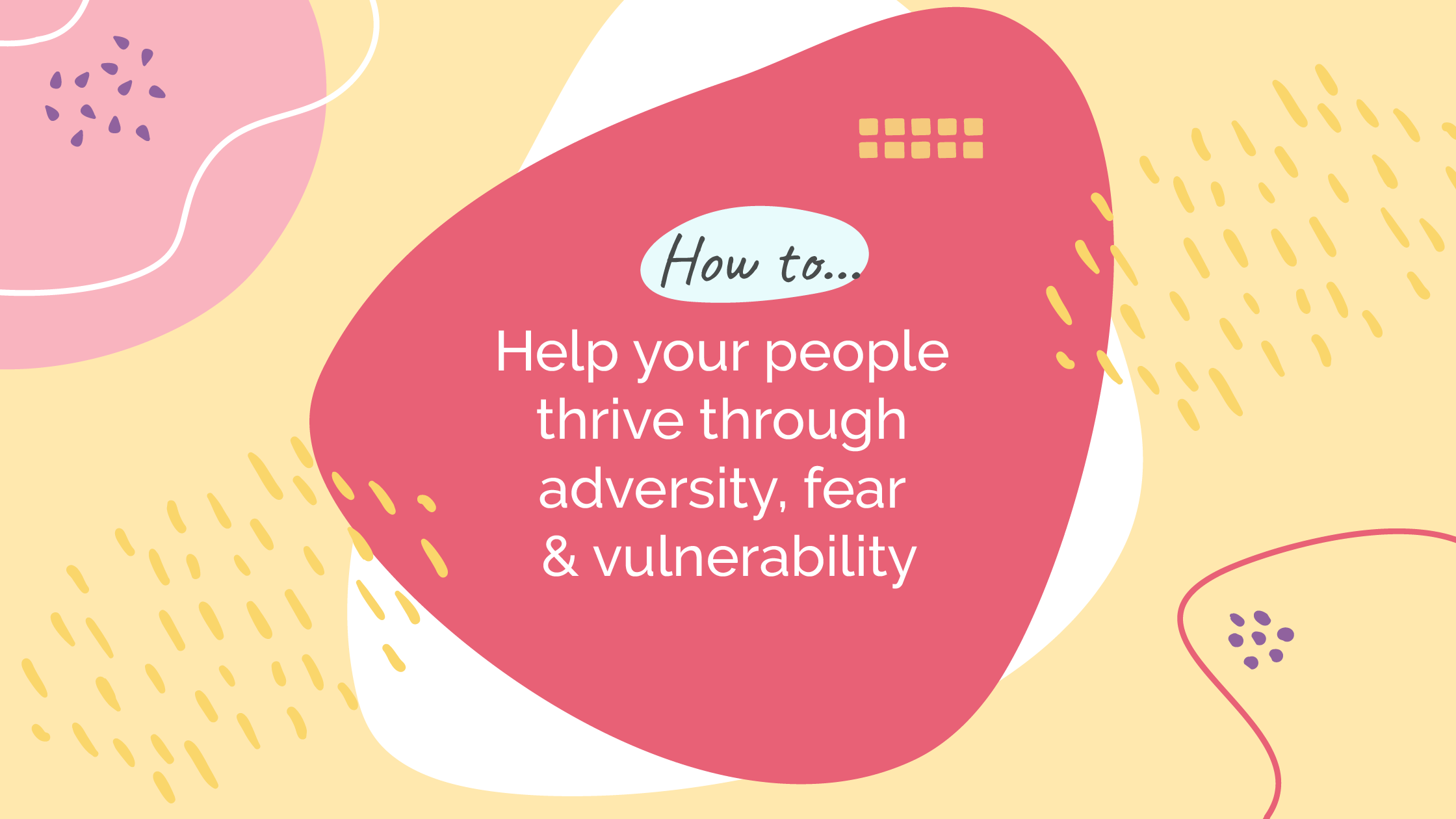The natural high of success, the breezy feeling of being on a roll – life sure is good when everything goes to plan.
We all know the saying ‘success breeds success’, that strange phenomenon where life brings you everything you want, but what’s going on when it all goes tits up? When suddenly nothing’s going your way and the only possible explanation is that your ex did some voodoo shit on you…
With Corona so rudely overstaying its welcome, this has been a time when many of us feel helpless and overwhelmed, and when you’re wrung out like that, even the tiniest mistakes can feel enormous. But pandemic aside, how good have we ever really been at processing negative events? Do we let adversity, our fears and vulnerabilities snowball? Do we let it affect our performance and more importantly, our mental health?
I think a lot of the time, we do.
So what if you could help your people to shift their perception of these situations and the way they react to them? If you could give them the tools to turn it around, so that instead of spiralling, they reframe it, and see it as an opportunity to grow? Just imagine what a positive and powerful impact that would have on your people, your team morale and company culture!
Back in Autumn 2021, I interviewed 16 incredible people through a virtual seminar in celebration of World Mental Health Day. Bringing us revelation after revelation through personal experience and imparted wisdom, they shared how they’ve transformed their lives in spite of (but also because of ) some of life’s biggest shitstorms.
So below I’ve shared three toolkits inspired by these contributors, their hacks and daily positive behaviours that will give you and your team the tools they need to both combat and thrive through adversity, fear and self-consciousness, helping them to reach their full potential by:
- Helping them to find their hard (and go harder)
- Fighting fear and fleeing their comfort zone
- Giving less of a Fuck!
Fight fear and flee your comfort zone
We’re all pretty good at saying to other people ‘Go on, have a go, what’s the worst that can happen?’ But we’re not always good at practising what we preach, and we’re so terrified of failing, that we often freeze! But really, there’s no surer way to fail than to never try.
Someone who knows a bit about this is Sebastian Foucan, global ambassador for Parkour! He has taken the philosophy for this high-octane sport and distilled it into his coaching business:
”Fear is an illusion. We should not be ruled by it. Life can be a struggle and a challenge, but to accept that challenge you have to overcome fear and take a risk…You don’t have to take a huge jump. You can take small steps, and do it bit by bit. But each time you take a leap, large or small, make a full commitment to it.”
In fact in the workplace, fear is the enemy of risk, and risk, especially the calculated sort, is what makes a company and its occupants thrive. So below we’ve given you three challenges that you can use with your teams when you sense their fear of trying is getting in the way of growth…
Three Challenges to help your people conquer their fears:
- Gently expose them to the fear – by doing this, you shrink it until it no longer concerns them. (The fear of public speaking tends to be a common one, so if you’ve got people in your team who are scared of pitching or speaking in front of groups, start them off small. For example, expose them gently to their fear by asking them to practise a presentation out loud, but just to themselves, then to a flatmate or partner, and then to a small group of peers at work that they feel comfortable with. It’s all about the small steps!)
- Ask them to look at the threat level – what’s really the worst that can happen? And if the worst does happen, will they be annihilated? If not, take the first step!
- Remind them that they don’t need to be perfect – fear thrives on perfectionism. They can only be ‘good enough’
Help them to find their hard, and go harder.
Shouldering up to adversity – it might sound counterintuitive, but it can actually be a really positive thing! In fact, encouraging your people to self-impose adversity can foster a growth mindset whilst also strengthening their capacity to deal with life’s inevitable, incoming bullshit!
As Royal Marine Ben Williams said
”Everything is easy when it’s going right. Self-imposed adversity is about changing yourself, pushing yourself out of your comfort zone. For example, some people are scared of public speaking but if you want to grow you need to speak in front of people.”
So how can you introduce your people to the idea of self-imposed adversity?
Here are 3 challenges that will help your people get used to finding their hard (don’t worry there aren’t any Marine-style mud runs):
- Ask them to pick a day, and spend it doing the opposite of what they’d normally do! For example, you could ask them to spend a day in a new department that uses a completely different skill set to their own!
- Encourage them to try something new outside of work, to unearth a talent they never knew they had.
- Reckon they can give up booze for a month?! (Some will be halfway through dry Jan, and I’m sure already noticing an improvement in judgement and their perception of negative situations without the fog of alcohol!)
Giving less of a fuck
Let’s kick off with a quote from Mark Mason, who wrote an entirely glorious book on the subject
”In my life, I have given a fuck about many people and many things. I have also not given a fuck about many people and many things. And those fucks I have not given have made all the difference.”
Indeed knowing when not to care is a skill both worth learning, and worth teaching your people. It won’t turn them into heartless monsters, instead it helps boost their confidence, increase their ability to take calculated risks, and generally make them stronger people!
So, want to give your people the gift of not giving a fuck? Here’s how…
- Allow them to seek wisdom, not permission. By learning the difference between these two elements then weighing up the evidence, they will learn to make good decisions at work, and in their life.
- Don’t be too hard on their fuck ups, and don’t let them be too hard on themselves either. Aside from the fact that we’re all trying to muddle through, failure is often a major catalyst for learning. If your people are terrified of failure, then they won’t put themselves in situations where they can grow, which limits their true potential as your employee.
- Past situations aren’t worth giving a fuck about. If there’s nothing they can do about the past (tip: there usually isn’t) then leave it behind. Same goes for the future. If they can shape it, great. If they can’t, don’t worry – and don’t give a fuck.
- Do something stupid for a change. If you can show your silly side to your team and reveal some vulnerability, it will reassure them that they can too!
This is just a snapshot of what’s inside PUSH’s new book ‘High Potential Hacks – The Positive Behaviours of The Highest Performing People.’
We’d love for you and your people to benefit from more of its magic, so download your free copy below or share it with your team… it might just change their life!

more articles by Cate Murden

